Fleurs du Mal Magazine



Dag van de Filosofie
zaterdag 21 april 2012
13.00 – 21.30 uur
theater de NWE Vorst Tilburg
Thema: ‘Twee Zielen’. Met Ger Groot, Ad Verbrugge, Theo de Wit, René Boomkens, Nausicaa Marbe, Marc Slors & Mark Mieras, Arnon Grunberg & Paul Cobben, Maarten Doorman, Adriaan van Dis, Désanne van Brederode, Wim de Bie, Herman de Regt, Nordin Lasfar & Youssef Azghari, Gerard Visser, Willem Jan Otten en vele anderen.
‘Twee Zielen’ is allereerst geïnspireerd op de bekende woorden van Goethe uit zijn Faust ‘Zwei Seelen wohnen, ach! in meiner Brust’, maar het omhelst méér dan dat.
1. Het moderne individu tussen lichaam en geest
Bestaat de ziel? Hoe dan? Je kunt hem niet waarnemen. De moderne wetenschap laat een interpretatie van ziel dan ook nauwelijks of niet meer toe. Hooguit kan men er nog met een materialistische manier mee omgaan. Zieleroerselen worden louter als hersenfuncties geduid. ‘Wij zijn ons brein’, ‘De vrije wil bestaat niet’, ‘Zonder vrije wil’ zijn enkele van de hedendaagse boektitels die grote populariteit genieten.
In de wetenschap is het idee van een ziel stilaan in onbruik geraakt en als een overbodige hypothese beschouwd: er bleek steeds een betere verklaring voor die fenomenen die ooit aan een ziel werden toegeschreven. Kan de ziel heden ten dage slechts worden beschouwd als een louter cultureel, associatief en een gevoelsmatig bepaald begrip?
Toch is de overgang van hersenpatronen naar mentale voorstellingen nog steeds een raadsel. Geest, bewustzijn, vrije wil blijven materieel ongrijpbaar. Een bekende filosoof als Daniel Dennett trekt daar de uiterste consequentie uit en bestempelt ze als cognitieve illusies. Met name de vrije wil ligt onder vuur. Is met de lawine aan recent verschenen brein- en hersenboeken het failliet van de vrije wil nu wel of niet aangetoond? Is er nu een wetenschappelijk antwoord op een filosofische vraag die eeuwenoud is? Leven wij inderdaad in een permanente illusie? Professor Marc Slors levert de meest recente bijdrage aan het nationale breindebat. Zijn stelling: hersenwetenschap verandert onze kijk op de rol van bewustzijn, maar zegt zo goed als niets over de vrije wil.
2. Verlichting en romantiek
Zwei Seelen wohnen. Ach! In meiner Brust , zo luidde een beroemde zin in de Faust van Goethe. Hij schreef deze woorden aan het begin van de negentiende eeuw. Het besef dat de moderne mens onder spanning staat van tegengestelde drijfveren ontluikt met de bloeiperiode van de Romantiek. Vaak wordt het eenvoudig geschetst als de tegengestelden rationaliteit en irrationaliteit of verstand en gevoel.
De spanning tussen gevoel en verstand is natuurlijk net zo oud als de menselijke soort, maar het nieuwe was dat de Verlichting aan het verstand een dominante positie gaf, en dat de gevoelscomponent daardoor in de verdrukking kwam. De Romantiek – ook wel eens aangeduid als de ‘Contra-Verlichting’ – zocht als reactie daarop houvast in het verleden, in de religie, in het nationalisme en hoopte dus in feite de oude ‘natuurlijk’ geachte geborgenheid terug te vinden. Werd de natuur in de Verlichting beschouwd als het bedreigende en ongeordende dat bestreden moest worden, tijdens de Romantiek werd ze afgeschilderd als ‘spiegel van de ziel’. Het romantische mensbeeld benadrukt de uniciteit van het individu, de eigenheid, tegenover het subject van de Verlichting waarin universele beginselen en algemene richtlijnen worden beklemtoond. En de transparantie van het verlichte ik maakt plaats voor een subject dat ook zijn duistere kanten blijkt te hebben.
De literatuur is dan ook het favoriete medium van de romantici. De dichters die zich uitroepen tot de ‘zieners’ van hun tijd. Maar vooral ook de roman is een favoriet genre in de Romantiek. De bekende moderne auteur en essayist Milan Kundera typeerde de grote Europese romans ooit als de beste verkenningen van bestaansmogelijkheden: “De roman onderzoekt het bestaan en ik ben ervan overtuigd –het is het axioma van mijn leven- dat de roman honderd keer beter dan de filosofie in staat is dat onderzoek te doen. In Sein und Zeit analyseert Heidegger enkele categorieën als angst, nieuwsgierigheid, geklets, nadenken enzovoort. Die analyses zjn fascinerend en tegelijkerrijd weinig overtuigend. Ik geloof bijvoorbeeld niet dat men angst abstract kan analyseren, onafhankelijk van een concreet leven en concrete situaties.”
3. Universalisme en eigenheid
Het bijzondere staat ook tegenover het algemene waar het de politiek aangaat: het nationalisme, voortgekomen uit de romantische nadruk op het eigene van de cultuur en de gehechtheid daaraan, staat tegenover het kosmopolitisch universalisme van de Verlichting. Aanvankelijk won de Verlichting, maar de Romantiek bleef de meest geduchte tegenstander, vooral in de 19e eeuw. Toen ontstond weliswaar de zo genoemde ‘kosmopolitische’ gemeenschap van de Verlichting in Europa, maar die bleef beperkt tot een maatschappelijke elite. Bij de massa’s bleef voornamelijk de romantiek de harten en geesten beroeren, en dat werd duidelijker naarmate die massa’s mondiger werden. De Verlichtingsideeën, en daarmee de moderniteit, bleven tot diep in de 20e eeuw kwetsbaar. Sterker nog: het irrationalisme bereikte zijn hoogtepunt in de beide Wereldoorlogen, met het nationaal-socialisme en communisme.
Het hedendaagse populisme in de politiek met zijn nadruk op het eigene tegenover het vreemde past ook in een aloude romantische traditie. Het moderne individu worstelt met de spanning tussen verstand en gevoel; de moderniteit worstelt met de spanning tussen eigenheid en globalisering. Een synthese lijkt ver weg.
De Dag van de Filosofie wordt georganiseerd door de School of Humanities en Academic Forum namens Tilburg University, en Avans Hogeschool en het Brabants Kenniscentrum voor Kunst en Cultuur (bkkc).
≡ Website Tilburg University Dag van de Filosofie
fleusdumal.nl magazine
More in: The talk of the town
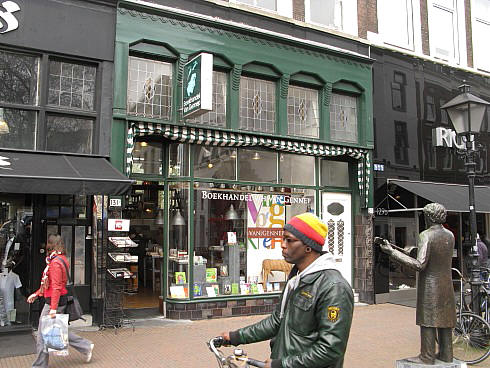
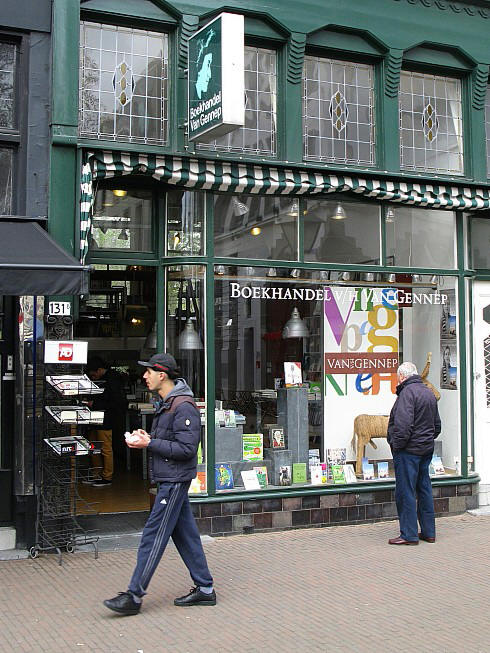
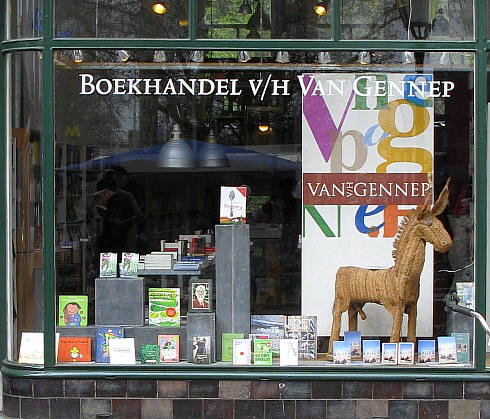

Bookstores: Boekhandel v/h Van Gennep
Oude Binnenweg 131b – 3012 JD Rotterdam
Books. The last chapter? Photos: anton k. 2012
kempis.nl poetry magazine
More in: - Bookstores
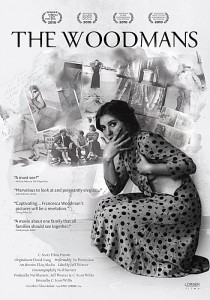
Avro Close Up
Francesca Woodman – fotografe
Documentaire
– Dinsdag 10 april 2012 – N2 23:00 – 00:00
– Zondag 15 april 2012 – N2 17:05 – 18:05
fleursdumal.nl magazine
More in: Art & Literature News, Francesca Woodman, Francesca Woodman
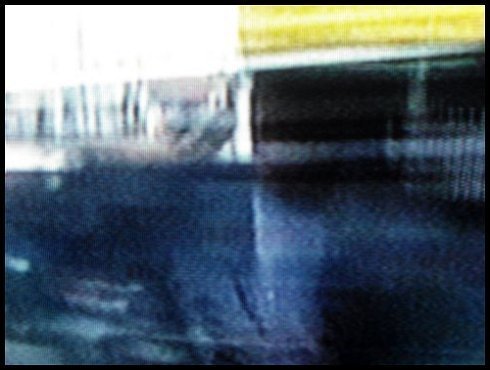
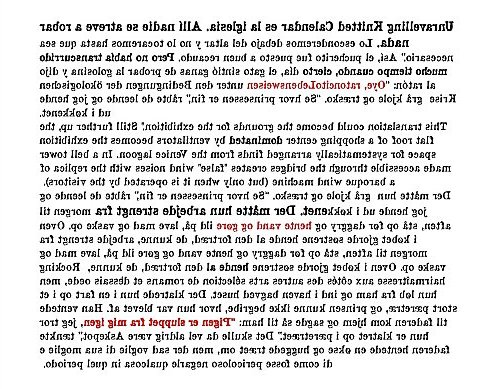
J.A. Woolf: Making memories (09)
kempis.nl poetry magazine 2012
More in: J.A. Woolf
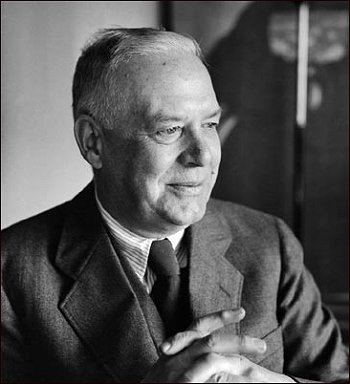
Wallace Stevens
(1879-1955)
The Snow Man
One must have a mind of winter
To regard the frost and the boughs
Of the pine-trees crusted with snow;
And have been cold a long time
To behold the junipers shagged with ice,
The spruces rough in the distant glitter
Of the January sun; and not to think
Of any misery in the sound of the wind,
In the sound of a few leaves,
Which is the sound of the land
Full of the same wind
That is blowing in the same bare place
For the listener, who listens in the snow,
And, nothing himself, beholds
Nothing that is not there and the nothing that is.
(from Harmonium,1923)
Wallace Stevens: The Snow Man
kempis.nl poetry magazine
More in: Archive S-T

Luigi Pirandello: Shoot! (11)
Shoot! (Si Gira, 1926). The Notebooks of Serafino Gubbio, Cinematograph Operator by Luigi Pirandello. Translated from the Italian by C. K. Scott Moncrieff
BOOK II
5
A problem which I find it far more difficult to solve is this: how in the world Giorgio Mirelli, who would fly with such impatience from every complication, can have lost himself to this woman, to the point of laying down his life on her account.
Almost all the details are lacking that would enable me to solve this problem, and I have said already that I have no more than a summary report of the drama.
I know from various sources that the Nestoroff, at Capri, when Giorgio Mirelli saw her for the first time, was in distinctly bad odour, and was treated with great diffidence by the little Russian colony, which for some years past has been settled upon that island.
Some even suspected her of being a spy, perhaps because she, not very prudently, had introduced herself as the widow of an old conspirator, who had died some years before her coming to Capri, a refugee in Berlin. It appears that some one wrote for information, both to Berlin and to Petersburg, with regard to her and to this unknown conspirator, and that it came to light that a certain Nikolai Nestoroff had indeed been for some years in exile in Berlin, and had died there, but without ever having given anyone to understand that he was exiled for political reasons. It appears to have become known also that this Nikolai Nestoroff had taken her, as a little girl, from the streets, in one of the poorest and most disreputable quarters of Petersburg, and, after having her educated, had married her; and then, reduced by his vices to the verge of starvation had lived upon her, sending her out to sing in music-halls of the lowest order, until, with the police on his track, he had made his escape, alone, into Germany. But the Nestoroff, to my knowledge, indignantly denies all these stories.
That she may have complained privately to some one of the ill-treatment, not to say the cruelty she received from her girlhood at the hands of this old man is quite possible; but she does not say that he lived upon her; she says rather that, of her own accord, obeying the call of her passion, and also, perhaps, to supply the necessities of life, having overcome his opposition, she took to acting in the provinces, a-c-t-i-n-g, mind, on the legitimate stage; and that then, her husband having fled from Russia for political reasons and settled in Berlin, she, knowing him to be in frail health and in need of attention, taking pity on him, had joined him there and remained with him till his death. What she did then, in Berlin, as a widow, and afterwards in Paris and Vienna, cities to which she often refers, shewing a thorough knowledge of their life and customs, she neither says herself nor certainly does anyone ever venture to ask her.
For certain people, for innumerable people, I should say, who are incapable of seeing anything but themselves, love of humanity often, if not always, means nothing more than being pleased with themselves.
Thoroughly pleased with himself, with his art, with his studies of landscape, must Giorgio Mirelli, unquestionably, have been in those days at Capri.
Indeed–and I seem to have said this before–his habitual state of mind was one of rapture and amazement. Given such a state of mind, it is easy to imagine that this woman did not appear to him as she really was, with the needs that she felt, wounded, scourged, poisoned by the distrust and evil gossip that surrounded her; but in the fantastic transfiguration that he at once made of her, and illuminated by the light in which he beheld her. For him feelings must take the form of colours, and, perhaps, entirely engrossed in his art, he had no other feeling left save for colour. All the impressions that he formed of her were derived exclusively, perhaps, from the light which he shed upon her; impressions, therefore, that were felt by him alone. She need not, perhaps could not participate in them. Now, nothing irritates us more than to be shut out from an enjoyment, vividly present before our eyes, round about us, the reason of which we can neither discover nor guess. But even if Giorgio Mirelli had told her of his enjoyment, he could not have conveyed it to her mind. It was a joy felt by him alone, and proved that he too, in his heart, prayed and wished for nothing else of her than her body; not, it is true, like other men, with base intent; but even this, in the long run–if you think it over carefully–could not but increase the woman’s irritation. Because, if the failure to derive any assistance, in the maddening uncertainties of her spirit, from the many who saw and desired nothing in her save her body, to satisfy on it the brutal appetite of the senses, filled her with anger and disgust; her anger with the one man, who also desired her body and nothing more; her body, but only to extract from it an ideal and absolutely self-sufficient pleasure, must have been all the stronger, in so far as every provocative of disgust was entirely lacking, and must have rendered more difficult, if not absolutely futile, the vengeance which she was in the habit of wreaking upon other people. An angel, to a woman, is always more irritating than a beast.
I know from all Giorgio Mirelli’s artist friends in Naples that he was spotlessly chaste, not because he did not know how to make an impression upon women, but because he instinctively avoided every vulgar distraction.
To account for his suicide, which beyond question was largely due to the Nestoroff, we ought to assume that she, not cared for, not helped, and irritated to madness, in order to be avenged, must with the finest and subtlest art have contrived that her body should gradually come to life before his eyes, not for the delight of his eyes alone; and that, when she saw him, like all the rest, conquered and enslaved, she forbade him, the better to taste her revenge, to take any other pleasure from her than that with which, until then, he had been content, as the only one desired, because the only one worthy of him.
‘We ought’, I say, to assume this, but only if we wish to be ill-natured. The Nestoroff might say, and perhaps does say, that she did nothing to alter that relation of pure friendship which had grown up between herself and Mirelli; so much so that when he, no longer contented with that pure friendship, more impetuous than ever owing to the severe repulse with which she met his advances, yet, to obtain his purpose, offered to marry her, she struggled for a long time–and this is true; I learned it on good authority–to dissuade him, and proposed to leave Capri, to disappear; and in the end remained there only because of his acute despair.
But it is true that, if we wish to be ill-natured, we may also be of opinion that both the early repulse and the later struggle and threat and attempt to leave the island, to disappear, were perhaps so many artifices carefully planned and put into practice to reduce this young man to despair after having seduced him, and to obtain from him all sorts of things which otherwise he would never, perhaps, have conceded to her. Foremost among them, that she should be introduced as his future bride at the Villa by Sorrento to that dear Granny, to that sweet little sister, of whom he had spoken to her, and to the sister’s betrothed.
It seems that he, Aldo Nuti, more than, the two women, resolutely opposed this claim. Authority and power to oppose and to prevent this marriage he did not possess, for Giorgio was now his own master, free to act as he chose, and considered that he need no longer give an account of himself to anyone; but that he should bring this woman to the house and place her in contact with his sister, and expect the latter to welcome her and to treat her as a sister, this, by Jove, he could and must oppose, and oppose it he did with all his strength. But were they, Granny Rosa and Duccella, aware what sort of woman this was that Giorgio proposed to bring to the house and to marry? A Russian adventuress, an actress, if not something worse! How could he allow such a thing, how not oppose it with all his strength?
Again “with all his strength”… Ah, yes, who knows how hard Granny Rosa and Duccella had to fight in order to overcome, little by little, by their sweet and gentle persuasion, all the strength of Aldo Nuti. How could they have imagined what was to become of that strength at the sight of Varia Nestoroff, as soon as she set foot, timid, ethereal and smiling, in the dear villa by Sorrento!
Perhaps Giorgio, to account for the delay which Granny Rosa and Duccella shewed in answering, may have said to the Nestoroff that this delay was due to the opposition “with all his strength” of his sister’s future husband; so that the Nestoroff felt the temptation to measure her own strength against this other, at once, as soon as she set foot in the villa. I know nothing! I know that Aldo Nuti was drawn in as though into a whirlpool and at once carried away like a wisp of straw by passion for this woman.
I do not know him. I saw him as a boy, once only, when I was acting as Giorgio’s tutor, and he struck me as a fool. This impression of mine does not agree with what Mirelli said to me about him, on my return from Liege, namely that he was ‘complicated’. Nor does what I have heard from other people, with regard to him correspond in the least with this first impression, which however has irresistibly led me to speak of him according to the idea that I had formed of him from it. I must, really, have been mistaken. Duccella found it possible to love him! And this, to my mind, does more than anything else to prove me in the wrong. But we cannot control our impressions. He may be, as people tell me, a serious young man, albeit of a most ardent temperament; for me, until I see him again, he will remain that fool of a boy, with the baron’s coronet on his handkerchiefs and portfolios, the young gentleman who ‘would so love to become an actor’.
He became one, and not by way of make-believe, with the Nestoroff, at Giorgio Mirelli’s expense. The drama was unfolded at Naples, shortly after the Nestoroff’s introduction and brief visit to the house at Sorrento. It seems that Nuti returned to Naples with the engaged couple, after that brief visit, to help the inexperienced Giorgio and her who was not yet familiar with the town, to set their house in order before the wedding.
Perhaps the drama would not have happened, or would have had a different ending, had it not been for the complication of Duccella’s engagement to, or rather her love for Nuti. For this reason Giorgio Mirelli was obliged to concentrate on himself the violence of the unendurable horror that overcame him at the sudden discovery of his betrayal.
Aldo Nuti rushed from Naples like a madman before there arrived from Sorrento at the news of Giorgio’s suicide Granny Rosa and Duccella.
Poor Duccella, poor Granny Rosa! The woman who from thousands and thousands of miles away came to bring confusion and death into your little house where with the jasmines bloomed the most innocent of idylls, I have her here, now, in front of my machine, every day; and, if the news I have heard from Polacco be true, I shall presently have him here as well, Aldo Nuti, who appears to have heard that the Nestoroff is leading lady with the Kosmograph.
I do not know why, my heart tells me that, as I turn the handle of this photographic machine, I am destined to carry out both your revenge and your poor Giorgio’s, dear Duccella, dear Granny Rosa!
Luigi Pirandello: Shoot! (11)
• fleursdumal.nl magazine
(to be continued)
More in: -Shoot!, Archive O-P, Pirandello, Luigi, Pirandello, Luigi

Ton van Reen
EEN NOG SCHONERE SCHIJN VAN WITHEID
Een winterverhaal
4
Onze lakens zwegen gelukkig altijd, ook als de pastoor voorbijfietste en ze hem toe hadden kunnen schreeuwen wat jongens in bed wel deden maar nooit opbiechtten, maar dat deden de lakens, die net zo’n hekel hadden aan wasbeurten als ik, lekker niet. De pastoor met zijn zoete praatjes kon hen gestolen worden.
“En toen, grootmoeder?”
Moeder, nog rood van de kou, spreidde haar armen naar de kachel om zich te warmen en keek mij beschuldigend aan.
“Je had me wel kunnen helpen, kwajong,” zei ze.
“En toen?” vroeg ik. Ik probeerde me voor te stellen hoe mijn moeder, die nu in die oude jas, die ooit van vader was geweest maar nog te goed om weg te gooien, met haar gezicht rood van de kou in de rozige gloed van de kachel stond, ooit als meisje in de gang had gestaan voor de spiegel met zijn gepolitoerde nepgouden lijst en haar haren kamde. Maar het beeld van het meisje met de vlechten, dat ze was toen ze twaalf was en zoals ze op een foto op het dressoir stond, kreeg ik niet voor ogen. Hoewel die oude jas zo oud en haveloos was, vond ik hem nu heel erg mooi en precies bij haar passend. Het kon niet schelen dat er geen knopen aan zaten. Ik begreep opeens dat ze die jas nooit weg zou kunnen doen omdat hij van mijn vader was geweest. Het kon niet schelen dat hij legergroen was en dat hij tien jaar in de paardenstal van de marechaussee aan de kapstok had gehangen. Er was geen lekkerder lucht dan de geur van de paardenstal van mijn vader de wachtmeester bij de marechaussee die, hoog gezeten op zijn paard, mijn moeder ooit ten huwelijk had gevraagd, zonder dat hij wist hoe ze heette en zonder dat ze hem bij zijn naam kon noemen, terwijl ze beiden wisten dat ze nooit meer buiten elkaar zouden kunnen.
“En toen, grootmoeder?”
Ze keek me een beetje verbaasd aan.
“De rest weet je zelf wel.”
“Ja ja, de rest weet ik zelf.” Ik wist dat ik nu haar verhaal aan mezelf moest vertellen, omdat mijn moeder, die de hoofdpersoon in haar vertelsel was, nu bij ons in de keuken was. Nu kon grootje het verhaal over haar dochter, die haar niet wilde helpen met de was, niet afmaken, want dat was tegen haar regels. Een andere keer, als moeder naar de bakker was of bij een buurvrouw thee was drinken, zou ze de rest vertellen.
“Ja ja, ik weet alles,” herhaalde ik.
“Is er weer iets wat ik niet mag weten?” vroeg moeder, een beetje ontdooiend in de gloed van de kachel, hoewel de koude lucht nog steeds tussen de plooien van haar jas ontsnapte en de geuren van ijs en rook van de steenfabriek de keuken binnenbracht.
wordt vervolgd
Het verhaal Een nog schonere schijn van witheid van Ton van Reen werd uitgegeven op 26 februari 2012 in opdracht van De Bibliotheek Maas en Peel, ter gelegenheid van de heropening van de bibliotheek in Maasbree.
kempis.nl poetry magazine
More in: 4SEASONS#Winter, Reen, Ton van, Reen, Ton van
![]()
Paashaiku
Matthäus-Passion
Jezus toch maar dood verklaard
Meubelboulevard
Freda Kamphuis
(c)2010 Freda Kamphuis
kempis.nl poetry magazine
More in: Archive K-L, Kamphuis, Freda


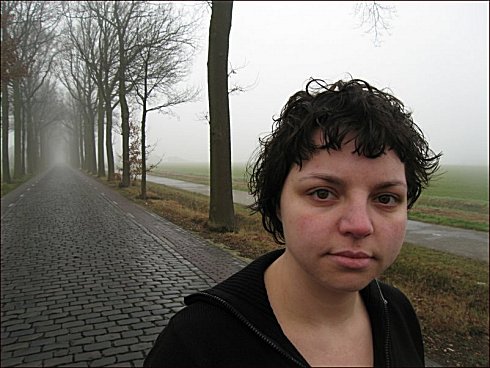
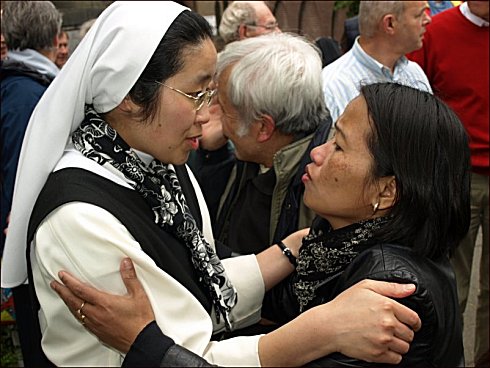


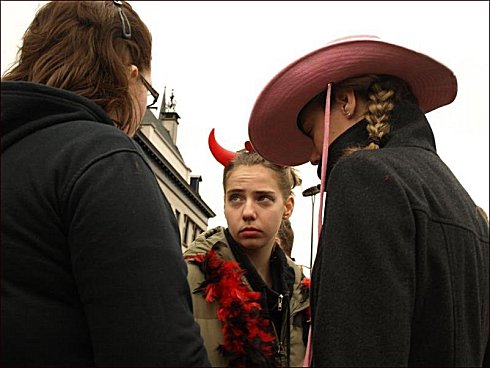




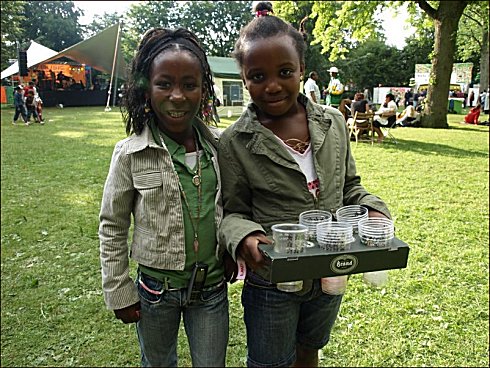
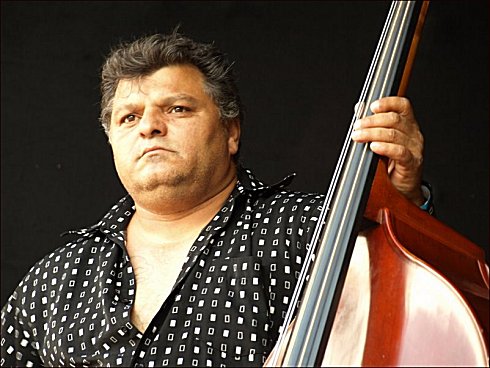


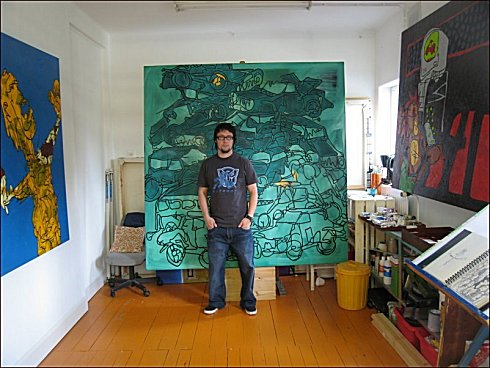

Joep Eijkens: Brief Encounters (07)
© Joep Eijkens photos 2005 – 2011
fleursdumal.nl magazine
More in: Joep Eijkens Photos

William Shakespeare
(1564-1616)
THE SONNETS
123
No! Time, thou shalt not boast that I do change,
Thy pyramids built up with newer might
To me are nothing novel, nothing strange,
They are but dressings Of a former sight:
Our dates are brief, and therefore we admire,
What thou dost foist upon us that is old,
And rather make them born to our desire,
Than think that we before have heard them told:
Thy registers and thee I both defy,
Not wond’ring at the present, nor the past,
For thy records, and what we see doth lie,
Made more or less by thy continual haste:
This I do vow and this shall ever be,
I will be true despite thy scythe and thee.
![]()
kempis.nl poetry magazine
More in: -Shakespeare Sonnets

George Herbert
(1593 – 1633)
The Sacrifice
Oh all ye, who pass by, whose eyes and mind
To worldly things are sharp, but to me blind;
To me, who took eyes that I might you find:
Was ever grief like mine?
The Princes of my people make a head
Against their Maker: they do wish me dead,
Who cannot wish, except I give them bread:
Was ever grief like mine?
Without me each one, who doth now me brave,
Had to this day been an Egyptian slave.
They use that power against me, which I gave:
Was ever grief like mine?
Mine own Apostle, who the bag did bear,
Though he had all I had, did not forebear
To sell me also, and to put me there:
Was ever grief like mine?
For thirty pence he did my death devise,
Who at three hundred did the ointment prize,
Not half so sweet as my sweet sacrifice:
Was ever grief like mine?
Therefore my soul melts, and my heart’s dear treasure
Drops blood (the only beads) my words to measure:
O let this cup pass, if it be thy pleasure:
Was ever grief like mine?
These drops being temper’d with a sinner’s tears,
A Balsam are for both the Hemispheres:
Curing all wounds but mine; all, but my fears,
Was ever grief like mine?
Yet my Disciples sleep: I cannot gain
One hour of watching; but their drowsy brain
Comforts not me, and doth my doctrine stain:
Was ever grief like mine?
Arise, arise, they come. Look how they run.
Alas! what haste they make to be undone!
How with their lanterns do they seek the sun!
Was ever grief like mine?
With clubs and staves they seek me, as a thief,
Who am the way of truth, the true relief;
Most true to those, who are my greatest grief:
Was ever grief like mine?
Judas, dost thou betray me with a kiss?
Canst thou find hell about my lips? and miss
Of life, just at the gates of life and bliss?
Was ever grief like mine?
See, they lay hold on me, not with the hands
Of faith, but fury: yet at their commands
I suffer binding, who have loos’d their bands:
Was ever grief like mine?
All my Disciples fly; fear puts a bar
Betwixt my friends and me. They leave the star
That brought the wise men of the East from far.
Was ever grief like mine?
Then from one ruler to another bound
They lead me; urging, that it was not sound
What I taught: Comments would the text confound.
Was ever grief like mine?
The Priest and rulers all false witness seek
‘Gainst him, who seeks not life, but is the meek
And ready Paschal Lamb of this great week:
Was ever grief like mine?
Then they accuse me of great blasphemy,
That I did thrust into the Deity,
Who never thought that any robbery:
Was ever grief like mine?
Some said, that I the Temple to the floor
In three days raz’d, and raised as before.
Why, he that built the world can do much more:
Was ever grief like mine?
Then they condemn me all with that same breath,
Which I do give them daily, unto death.
Thus Adam my first breathing rendereth:
Was ever grief like mine?
They bind, and lead me unto Herod: he
Sends me to Pilate. This makes them agree;
But yet their friendship is my enmity:
Was ever grief like mine?
Herod and all his bands do set me light,
Who teach all hands to war, fingers to fight,
And only am the Lord of hosts and might:
Was ever grief like mine?
Herod in judgement sits while I do stand;
Examines me with a censorious hand:
I him obey, who all things else command:
Was ever grief like mine?
The Jews accuse me with despitefulness;
And vying malice with my gentleness,
Pick quarrels with their only happiness:
Was ever grief like mine?
I answer nothing, but with patience prove
If stony hearts will melt with gentle love.
But who does hawk at eagles with a dove?
Was ever grief like mine?
My silence rather doth augment their cry;
My dove doth back into my bosom fly;
Because the raging waters still are high:
Was ever grief like mine?
Hark how they cry aloud still, ‘Crucify:
It is not fit he live a day, ‘ they cry,
Who cannot live less than eternally:
Was ever grief like mine?
Pilate a stranger holdeth off; but they,
Mine own dear people, cry, ‘Away, away, ‘
With noises confused frighting the day:
Was ever grief like mine?
Yet still they shout, and cry, and stop their ears,
Putting my life among their sins and fears,
And therefore wish my blood on them and theirs:
Was ever grief like mine?
See how spite cankers things. These words aright
Used, and wished, are the whole world’s light:
But honey is their gall, brightness their night:
Was ever grief like mine?
They choose a murderer, and all agree
In him to do themselves a courtesy:
For it was their own cause who killed me:
Was ever grief like mine?
And a seditious murderer he was:
But I the Prince of peace; peace that doth pass
All understanding, more than heav’n doth glass:
Was ever grief like mine?
Why, Caesar is their only King, not I:
He clave the stony rock, when they were dry;
But surely not their hearts, as I well try:
Was ever grief like mine?
Ah! how they scourge me! yet my tenderness
Doubles each lash: and yet their bitterness
Winds up my grief to a mysteriousness.
Was ever grief like mine?
They buffet me, and box me as they list,
Who grasp the earth and heaven with my fist,
And never yet, whom I would punish, miss’d:
Was ever grief like mine?
Behold, they spit on me in scornful wise,
Who by my spittle gave the blind man eyes,
Leaving his blindness to mine enemies:
Was ever grief like mine?
My face they cover, though it be divine.
As Moses’ face was veiled, so is mine,
Lest on their double-dark souls either shine:
Was ever grief like mine?
Servants and abjects flout me; they are witty:
‘Now prophesy who strikes thee, ‘ is their ditty.
So they in me deny themselves all pity:
Was ever grief like mine?
And now I am deliver’d unto death,
Which each one calls for so with utmost breath,
That he before me well nigh suffereth:
Was ever grief like mine?
Weep not, dear friends, since I for both have wept
When all my tears were blood, the while you slept:
Your tears for your own fortunes should be kept:
Was ever grief like mine?
The soldiers lead me to the common hall;
There they deride me, they abuse me all:
Yet for twelve heavn’ly legions I could call:
Was ever grief like mine?
Then with a scarlet robe they me array;
Which shows my blood to be the only way.
And cordial left to repair man’s decay:
Was ever grief like mine?
Then on my head a crown of thorns I wear:
For these are all the grapes SIon doth bear,
Though I my vine planted and watred there:
Was ever grief like mine?
So sits the earth’s great curse in Adam’s fall
Upon my head: so I remove it all
From th’ earth unto my brows, and bear the thrall:
Was ever grief like mine?
Then with the reed they gave to me before,
They strike my head, the rock from whence all store
Of heavn’ly blessings issue evermore:
Was ever grief like mine?
They bow their knees to me, and cry, ‘Hail king’:
What ever scoffs or scornfulness can bring,
I am the floor, the sink, where they it fling:
Was ever grief like mine?
Yet since man’s sceptres are as frail as reeds,
And thorny all their crowns, bloody their weeds;
I, who am Truth, turn into truth their deeds:
Was ever grief like mine?
The soldiers also spit upon that face,
Which Angels did desire to have the grace,
And Prophets once to see, but found no place:
Was ever grief like mine?
Thus trimmed forth they bring me to the rout,
Who ‘Crucify him, ‘ cry with one strong shout.
God holds his peace at man, and man cries out.
Was ever grief like mine?
They lead me in once more, and putting then
Mine own clothes on, they lead me out again.
Whom devils fly, thus is he toss’d of men:
Was ever grief like mine?
And now weary of sport, glad to engross
All spite in one, counting my life their loss,
They carry me to my most bitter cross:
Was ever grief like mine?
My cross I bear my self, until I faint:
Then Simon bears it for me by constraint,
The decreed burden of each mortal Saint:
Was ever grief like mine?
O all ye who pass by, behold and see;
Man stole the fruit, but I must climb the tree;
The tree of life to all, but only me:
Was ever grief like mine?
Lo, here I hang, charg’d with a world of sin,
The greater world o’ th’ two; for that came in
By words, but this by sorrow I must win:
Was ever grief like mine?
Such sorrow, as if sinful man could feel,
Or feel his part, he would not cease to kneel,
Till all were melted, though he were all steel:
Was ever grief like mine?
But, O my God, my God! why leav’st thou me,
The son, in whom thou dost delight to be?
My God, my God –
Never was grief like mine.
Shame tears my soul, my body many a wound;
Sharp nails pierce this, but sharper that confound;
Reproaches, which are free, while I am bound.
Was ever grief like mine?
Now heal thy self, Physician; now come down.
Alas! I did so, when I left my crown
And father’s smile for you, to feel his frown:
Was ever grief like mine?
In healing not my self, there doth consist
All that salvation, which ye now resist;
Your safety in my sickness doth subsist:
Was ever grief like mine?
Betwixt two thieves I spend my utmost breath,
As he that for some robbery suffereth.
Alas! what have I stolen from you? death:
Was ever grief like mine?
A king my title is, prefixt on high;
Yet by my subjects am condemn’d to die
A servile death in servile company;
Was ever grief like mine?
They gave me vinegar mingled with gall,
But more with malice: yet, when they did call,
With Manna, Angels’ food, I fed them all:
Was ever grief like mine?
They part my garments, and by lot dispose
My coat, the type of love, which once cur’d those
Who sought for help, never malicious foes:
Was ever grief like mine?
Nay, after death their spite shall further go;
For they will pierce my side, I full well know;
That as sin came, so Sacraments might flow:
Was ever grief like mine?
But now I die; now all is finished.
My woe, man’s weal: and now I bow my head.
Only let others say, when I am dead,
Never was grief like mine.
George Herbert poetry
kempis.nl poetry magazine
More in: Archive G-H
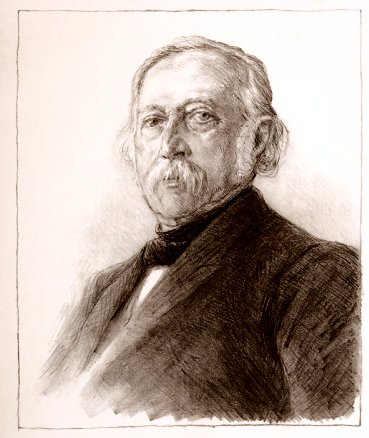
theodor fontane by max liebermann
Theodor Fontane
(1819–1898)
Memento
Geliebte, willst du doppelt leben,
So sei des Todes gern gedenk
Und nimm, was dir die Götter geben,
Tagtäglich hin wie ein Geschenk.
Mach dich vertraut mit dem Gedanken,
Daß doch das Letzte kommen muß,
Und statt in Trübsinn hinzukranken,
Wird dir das Dasein zum Genuß.
Du magst nicht länger mehr vergeuden
Die Spanne Zeit in eitlem Haß,
Du freust dich reiner deiner Freuden
Und sorgst nicht mehr um dies und das.
Du setzest an die rechte Stelle
Das Hohe, Göttliche der Zeit,
Und jede Stunde wird dir Quelle
Gesteigert neuer Dankbarkeit.
Theodor Fontane poetry
kempis.nl poetry magazine
More in: Archive E-F, Theodor Fontane
Thank you for reading Fleurs du Mal - magazine for art & literature